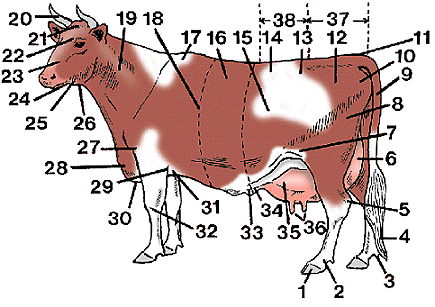1
a
: the mature female of cattle (genus Bos)
b
: the mature female of various usually large animals (such as an elephant, whale, or moose)
c
: a domestic bovine animal regardless of sex or age
2
informal, disparaging + offensive
: an unpleasant, annoying, or vacuous woman
- 1 hoof
- 2 pastern
- 3 dewclaw
- 4 switch
- 5 hock
- 6 rear udder
- 7 flank
- 8 thigh
- 9 tail
- 10 pinbone
- 11 tail head
- 12 thurl
- 13 hip
- 14 barrel
- 15 ribs
- 16 crops
- 17 withers
- 18 heart girth
- 19 neck
- 20 horn
- 21 poll
- 22 forehead
- 23 bridge of nose
- 24 muzzle
- 25 jaw
- 26 throat
- 27 point of shoulder
- 28 dewlap
- 29 point of elbow
- 30 brisket
- 31 chest floor
- 32 knee
- 33 milk well
- 34 milk vein
- 35 fore udder
- 36 teats
- 37 rump
- 38 loin
transitive verb
: to destroy the resolve or courage of
also
: to bring to a state or an action by intimidation
—used with into … like too many Asian armies, adept at cowing a population into feeding them … — Edward Lansdale
Edward Lansdale
Subscribe to America's largest dictionary and get thousands more definitions and advanced search—ad free!
Merriam-Webster unabridged












Share